Reflective Account: Experience Gained in Assessment 1 Development
VerifiedAdded on 2023/01/07
|6
|1445
|46
Report
AI Summary
This report provides a reflective account of the author's experience developing Assessment 1, focusing on the application of the Gibbs Reflective Cycle. The author describes the process of creating a poster on the effect of Human Resource Development on Employee Performance, detailing challenges such as time management and planning. The account highlights the learning experience, including the development of organizational and time management skills, and the importance of effective planning. The author reflects on both positive and negative aspects of the experience, identifying areas for improvement and strategies for future assessments, such as setting timelines and prioritizing tasks. The report concludes with a discussion of how the experience enhanced the author's skills and knowledge in relation to the course material. The reference section includes books and journals used in the process.
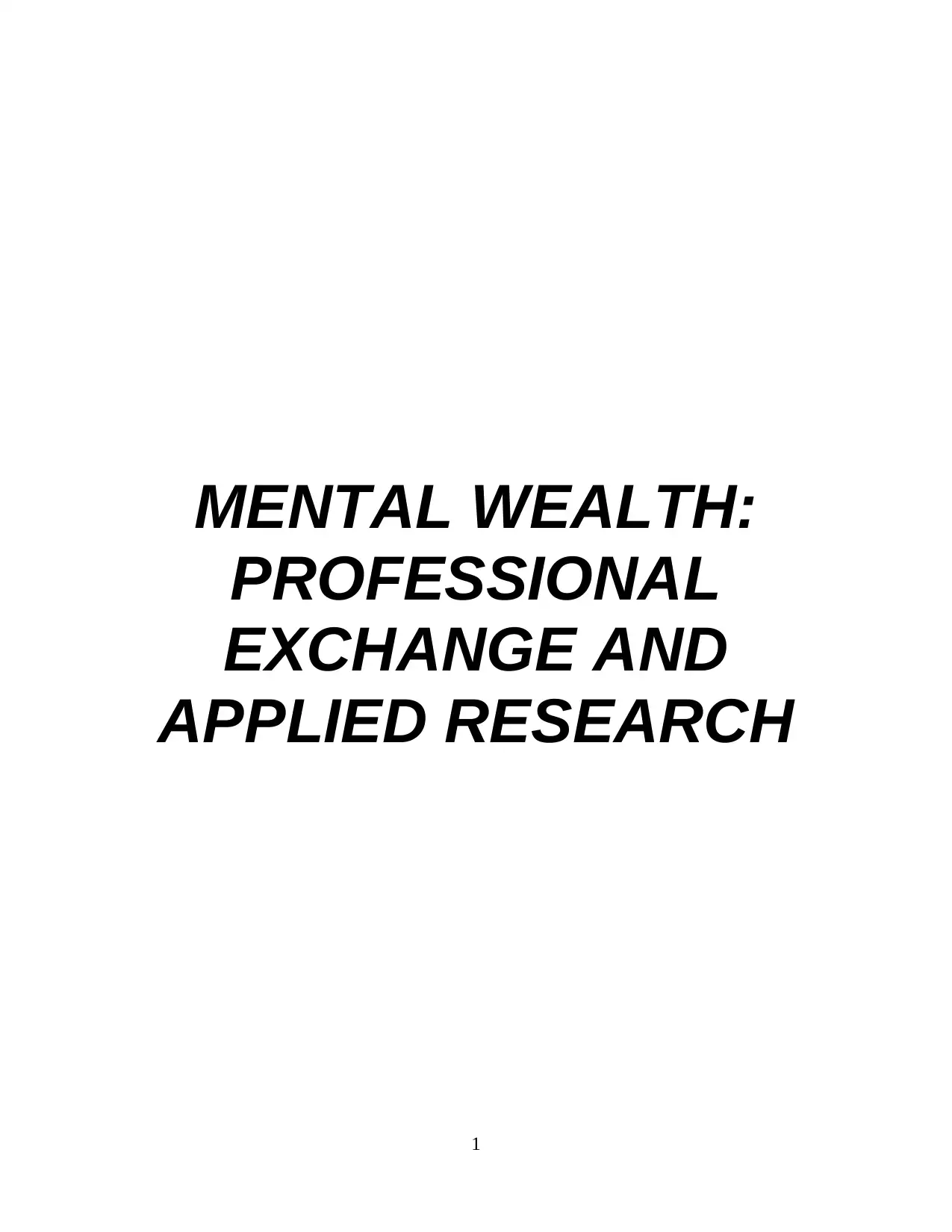
MENTAL WEALTH:
PROFESSIONAL
EXCHANGE AND
APPLIED RESEARCH
1
PROFESSIONAL
EXCHANGE AND
APPLIED RESEARCH
1
Paraphrase This Document
Need a fresh take? Get an instant paraphrase of this document with our AI Paraphraser
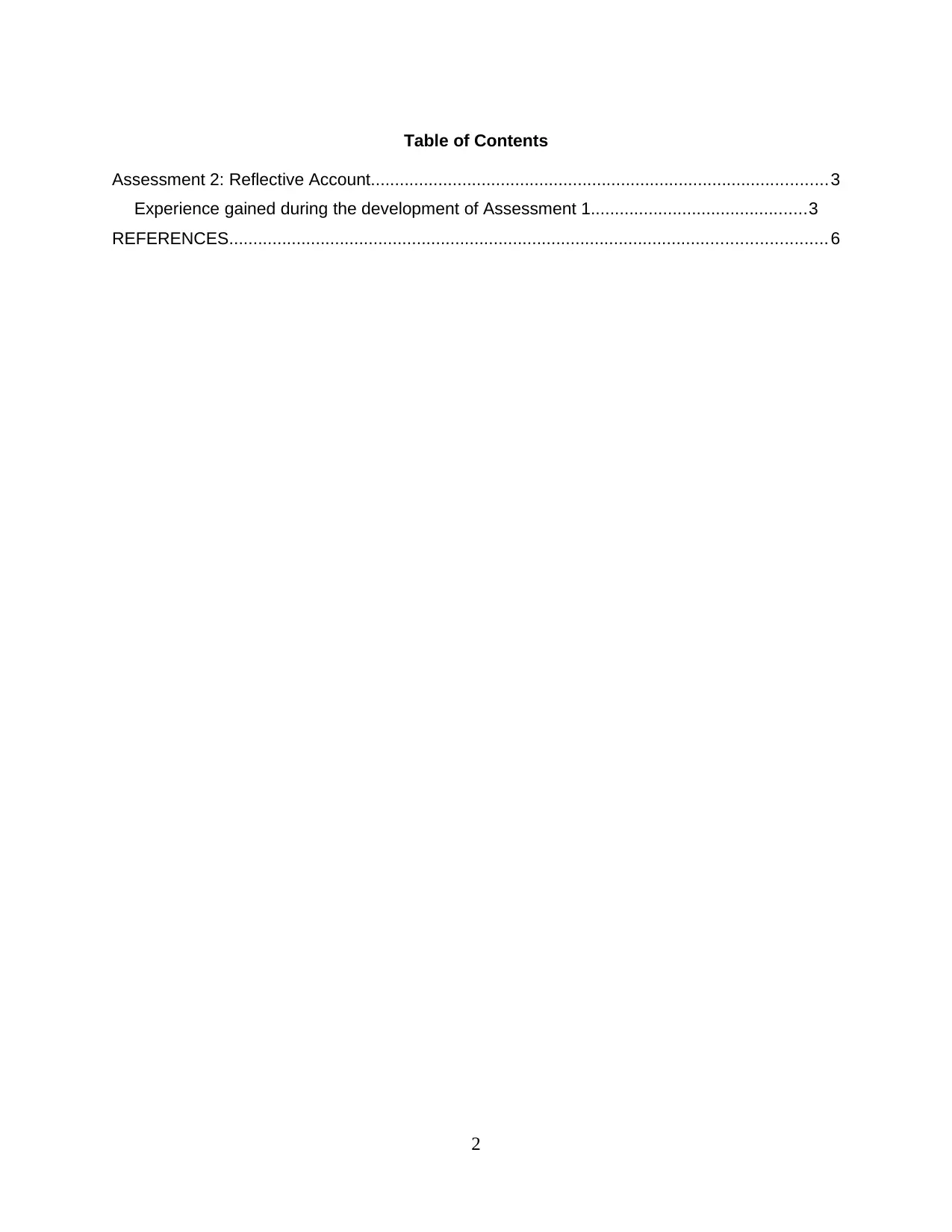
Table of Contents
Assessment 2: Reflective Account...............................................................................................3
Experience gained during the development of Assessment 1.............................................3
REFERENCES............................................................................................................................ 6
2
Assessment 2: Reflective Account...............................................................................................3
Experience gained during the development of Assessment 1.............................................3
REFERENCES............................................................................................................................ 6
2
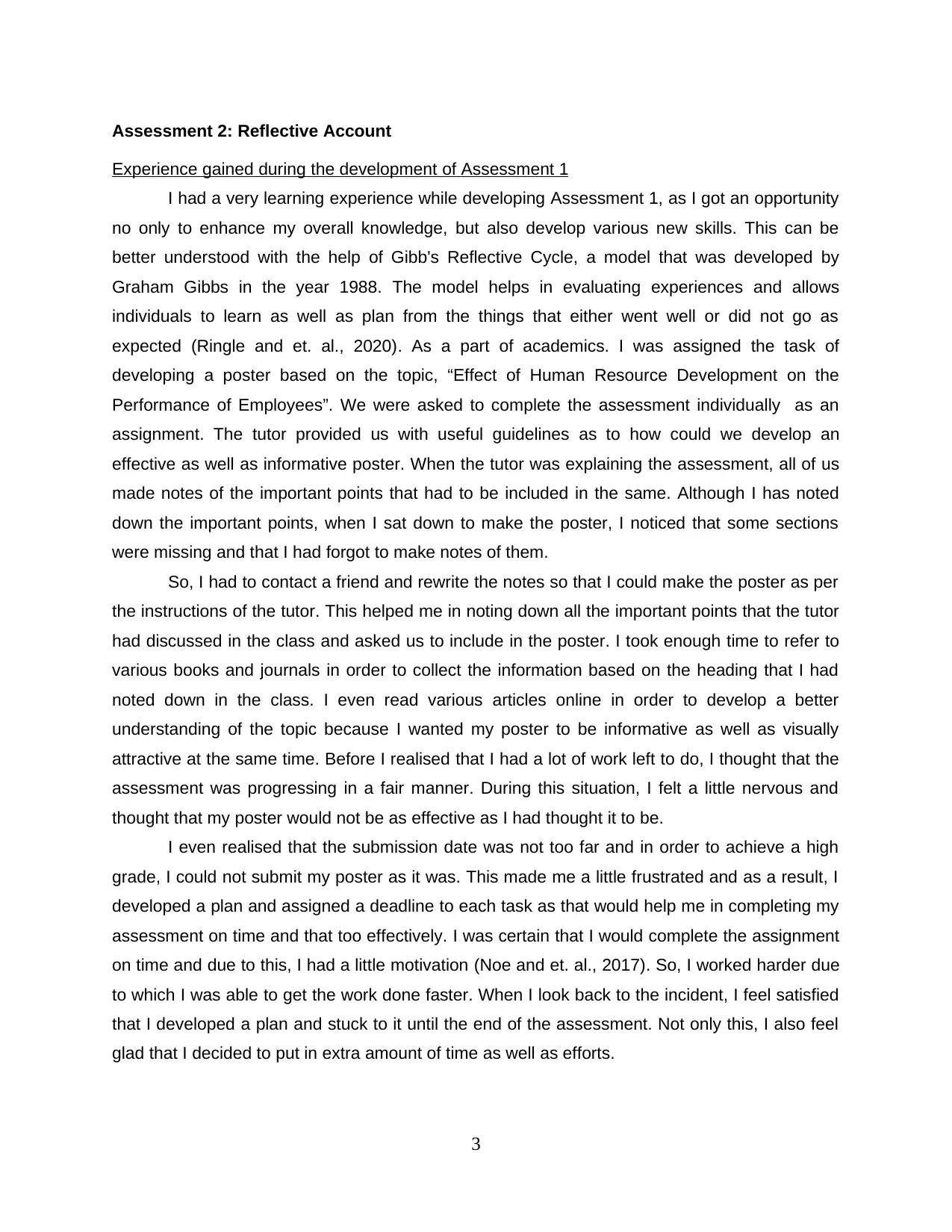
Assessment 2: Reflective Account
Experience gained during the development of Assessment 1
I had a very learning experience while developing Assessment 1, as I got an opportunity
no only to enhance my overall knowledge, but also develop various new skills. This can be
better understood with the help of Gibb's Reflective Cycle, a model that was developed by
Graham Gibbs in the year 1988. The model helps in evaluating experiences and allows
individuals to learn as well as plan from the things that either went well or did not go as
expected (Ringle and et. al., 2020). As a part of academics. I was assigned the task of
developing a poster based on the topic, “Effect of Human Resource Development on the
Performance of Employees”. We were asked to complete the assessment individually as an
assignment. The tutor provided us with useful guidelines as to how could we develop an
effective as well as informative poster. When the tutor was explaining the assessment, all of us
made notes of the important points that had to be included in the same. Although I has noted
down the important points, when I sat down to make the poster, I noticed that some sections
were missing and that I had forgot to make notes of them.
So, I had to contact a friend and rewrite the notes so that I could make the poster as per
the instructions of the tutor. This helped me in noting down all the important points that the tutor
had discussed in the class and asked us to include in the poster. I took enough time to refer to
various books and journals in order to collect the information based on the heading that I had
noted down in the class. I even read various articles online in order to develop a better
understanding of the topic because I wanted my poster to be informative as well as visually
attractive at the same time. Before I realised that I had a lot of work left to do, I thought that the
assessment was progressing in a fair manner. During this situation, I felt a little nervous and
thought that my poster would not be as effective as I had thought it to be.
I even realised that the submission date was not too far and in order to achieve a high
grade, I could not submit my poster as it was. This made me a little frustrated and as a result, I
developed a plan and assigned a deadline to each task as that would help me in completing my
assessment on time and that too effectively. I was certain that I would complete the assignment
on time and due to this, I had a little motivation (Noe and et. al., 2017). So, I worked harder due
to which I was able to get the work done faster. When I look back to the incident, I feel satisfied
that I developed a plan and stuck to it until the end of the assessment. Not only this, I also feel
glad that I decided to put in extra amount of time as well as efforts.
3
Experience gained during the development of Assessment 1
I had a very learning experience while developing Assessment 1, as I got an opportunity
no only to enhance my overall knowledge, but also develop various new skills. This can be
better understood with the help of Gibb's Reflective Cycle, a model that was developed by
Graham Gibbs in the year 1988. The model helps in evaluating experiences and allows
individuals to learn as well as plan from the things that either went well or did not go as
expected (Ringle and et. al., 2020). As a part of academics. I was assigned the task of
developing a poster based on the topic, “Effect of Human Resource Development on the
Performance of Employees”. We were asked to complete the assessment individually as an
assignment. The tutor provided us with useful guidelines as to how could we develop an
effective as well as informative poster. When the tutor was explaining the assessment, all of us
made notes of the important points that had to be included in the same. Although I has noted
down the important points, when I sat down to make the poster, I noticed that some sections
were missing and that I had forgot to make notes of them.
So, I had to contact a friend and rewrite the notes so that I could make the poster as per
the instructions of the tutor. This helped me in noting down all the important points that the tutor
had discussed in the class and asked us to include in the poster. I took enough time to refer to
various books and journals in order to collect the information based on the heading that I had
noted down in the class. I even read various articles online in order to develop a better
understanding of the topic because I wanted my poster to be informative as well as visually
attractive at the same time. Before I realised that I had a lot of work left to do, I thought that the
assessment was progressing in a fair manner. During this situation, I felt a little nervous and
thought that my poster would not be as effective as I had thought it to be.
I even realised that the submission date was not too far and in order to achieve a high
grade, I could not submit my poster as it was. This made me a little frustrated and as a result, I
developed a plan and assigned a deadline to each task as that would help me in completing my
assessment on time and that too effectively. I was certain that I would complete the assignment
on time and due to this, I had a little motivation (Noe and et. al., 2017). So, I worked harder due
to which I was able to get the work done faster. When I look back to the incident, I feel satisfied
that I developed a plan and stuck to it until the end of the assessment. Not only this, I also feel
glad that I decided to put in extra amount of time as well as efforts.
3
⊘ This is a preview!⊘
Do you want full access?
Subscribe today to unlock all pages.

Trusted by 1+ million students worldwide
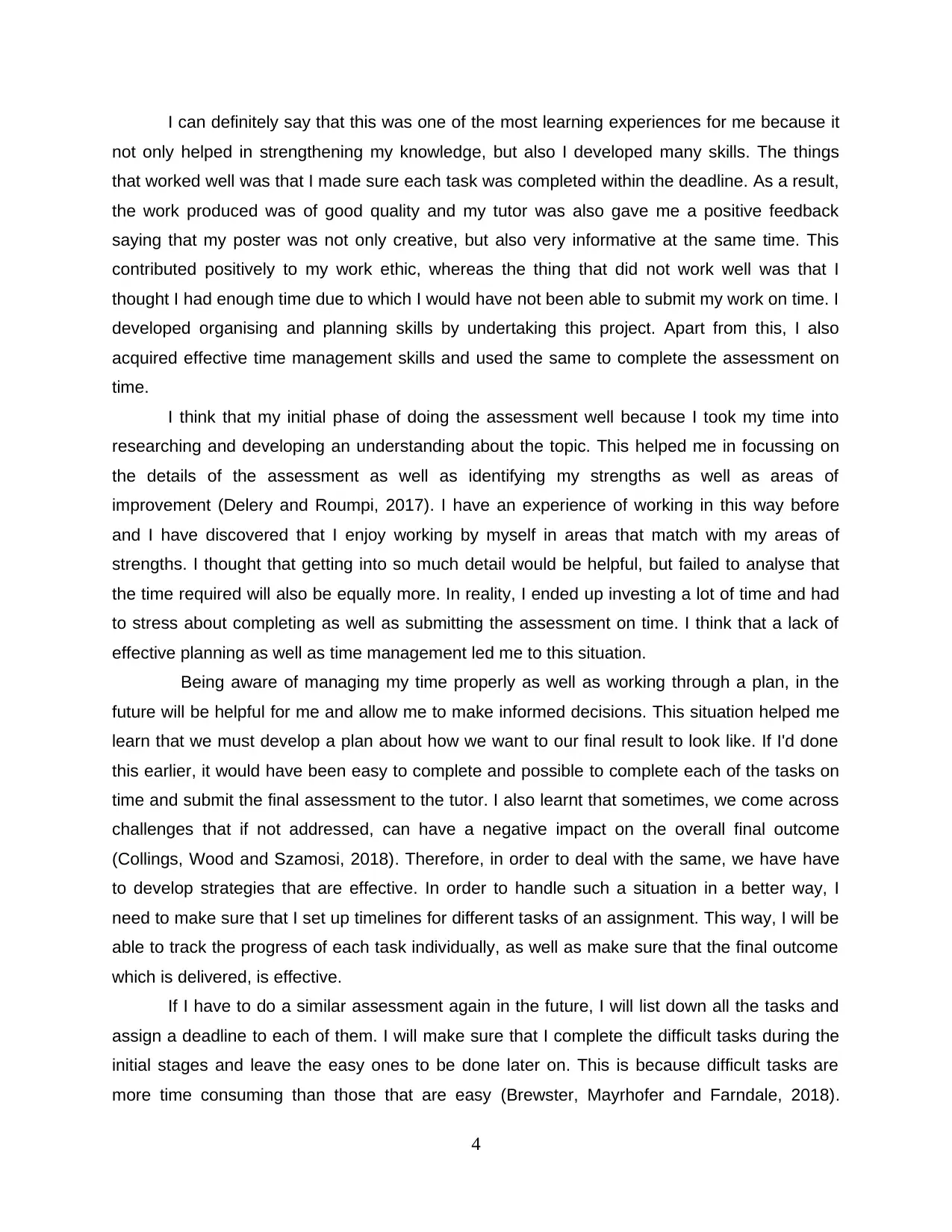
I can definitely say that this was one of the most learning experiences for me because it
not only helped in strengthening my knowledge, but also I developed many skills. The things
that worked well was that I made sure each task was completed within the deadline. As a result,
the work produced was of good quality and my tutor was also gave me a positive feedback
saying that my poster was not only creative, but also very informative at the same time. This
contributed positively to my work ethic, whereas the thing that did not work well was that I
thought I had enough time due to which I would have not been able to submit my work on time. I
developed organising and planning skills by undertaking this project. Apart from this, I also
acquired effective time management skills and used the same to complete the assessment on
time.
I think that my initial phase of doing the assessment well because I took my time into
researching and developing an understanding about the topic. This helped me in focussing on
the details of the assessment as well as identifying my strengths as well as areas of
improvement (Delery and Roumpi, 2017). I have an experience of working in this way before
and I have discovered that I enjoy working by myself in areas that match with my areas of
strengths. I thought that getting into so much detail would be helpful, but failed to analyse that
the time required will also be equally more. In reality, I ended up investing a lot of time and had
to stress about completing as well as submitting the assessment on time. I think that a lack of
effective planning as well as time management led me to this situation.
Being aware of managing my time properly as well as working through a plan, in the
future will be helpful for me and allow me to make informed decisions. This situation helped me
learn that we must develop a plan about how we want to our final result to look like. If I'd done
this earlier, it would have been easy to complete and possible to complete each of the tasks on
time and submit the final assessment to the tutor. I also learnt that sometimes, we come across
challenges that if not addressed, can have a negative impact on the overall final outcome
(Collings, Wood and Szamosi, 2018). Therefore, in order to deal with the same, we have have
to develop strategies that are effective. In order to handle such a situation in a better way, I
need to make sure that I set up timelines for different tasks of an assignment. This way, I will be
able to track the progress of each task individually, as well as make sure that the final outcome
which is delivered, is effective.
If I have to do a similar assessment again in the future, I will list down all the tasks and
assign a deadline to each of them. I will make sure that I complete the difficult tasks during the
initial stages and leave the easy ones to be done later on. This is because difficult tasks are
more time consuming than those that are easy (Brewster, Mayrhofer and Farndale, 2018).
4
not only helped in strengthening my knowledge, but also I developed many skills. The things
that worked well was that I made sure each task was completed within the deadline. As a result,
the work produced was of good quality and my tutor was also gave me a positive feedback
saying that my poster was not only creative, but also very informative at the same time. This
contributed positively to my work ethic, whereas the thing that did not work well was that I
thought I had enough time due to which I would have not been able to submit my work on time. I
developed organising and planning skills by undertaking this project. Apart from this, I also
acquired effective time management skills and used the same to complete the assessment on
time.
I think that my initial phase of doing the assessment well because I took my time into
researching and developing an understanding about the topic. This helped me in focussing on
the details of the assessment as well as identifying my strengths as well as areas of
improvement (Delery and Roumpi, 2017). I have an experience of working in this way before
and I have discovered that I enjoy working by myself in areas that match with my areas of
strengths. I thought that getting into so much detail would be helpful, but failed to analyse that
the time required will also be equally more. In reality, I ended up investing a lot of time and had
to stress about completing as well as submitting the assessment on time. I think that a lack of
effective planning as well as time management led me to this situation.
Being aware of managing my time properly as well as working through a plan, in the
future will be helpful for me and allow me to make informed decisions. This situation helped me
learn that we must develop a plan about how we want to our final result to look like. If I'd done
this earlier, it would have been easy to complete and possible to complete each of the tasks on
time and submit the final assessment to the tutor. I also learnt that sometimes, we come across
challenges that if not addressed, can have a negative impact on the overall final outcome
(Collings, Wood and Szamosi, 2018). Therefore, in order to deal with the same, we have have
to develop strategies that are effective. In order to handle such a situation in a better way, I
need to make sure that I set up timelines for different tasks of an assignment. This way, I will be
able to track the progress of each task individually, as well as make sure that the final outcome
which is delivered, is effective.
If I have to do a similar assessment again in the future, I will list down all the tasks and
assign a deadline to each of them. I will make sure that I complete the difficult tasks during the
initial stages and leave the easy ones to be done later on. This is because difficult tasks are
more time consuming than those that are easy (Brewster, Mayrhofer and Farndale, 2018).
4
Paraphrase This Document
Need a fresh take? Get an instant paraphrase of this document with our AI Paraphraser
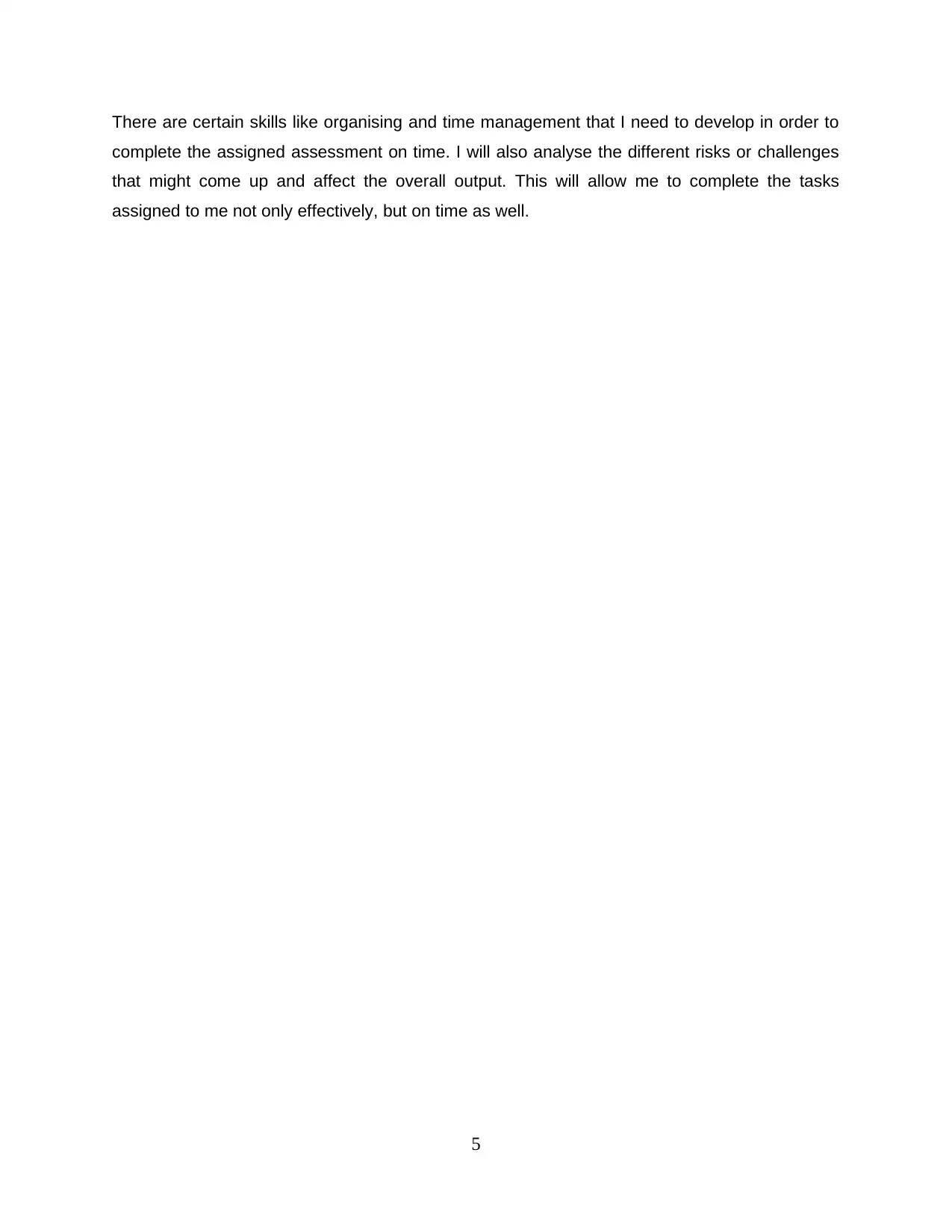
There are certain skills like organising and time management that I need to develop in order to
complete the assigned assessment on time. I will also analyse the different risks or challenges
that might come up and affect the overall output. This will allow me to complete the tasks
assigned to me not only effectively, but on time as well.
5
complete the assigned assessment on time. I will also analyse the different risks or challenges
that might come up and affect the overall output. This will allow me to complete the tasks
assigned to me not only effectively, but on time as well.
5
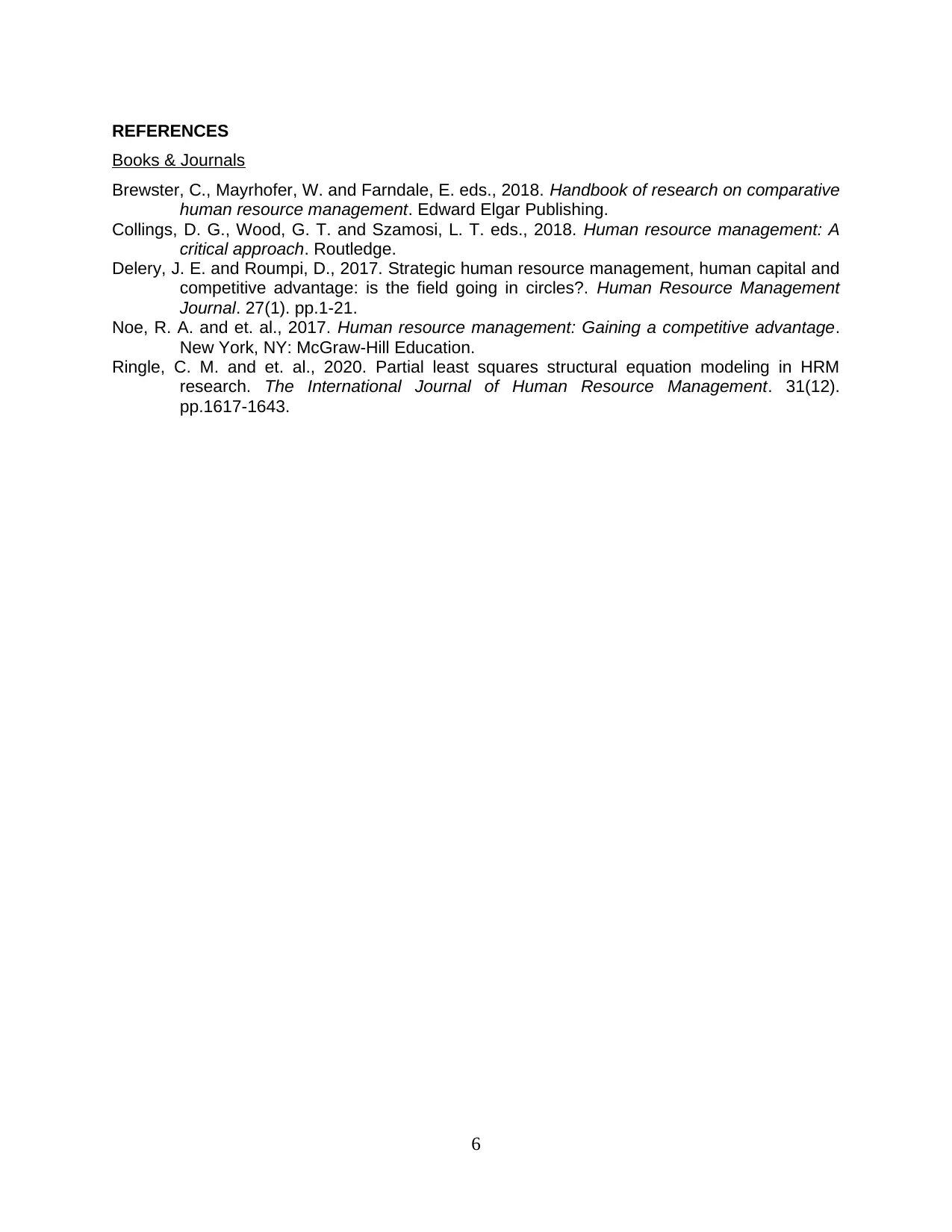
REFERENCES
Books & Journals
Brewster, C., Mayrhofer, W. and Farndale, E. eds., 2018. Handbook of research on comparative
human resource management. Edward Elgar Publishing.
Collings, D. G., Wood, G. T. and Szamosi, L. T. eds., 2018. Human resource management: A
critical approach. Routledge.
Delery, J. E. and Roumpi, D., 2017. Strategic human resource management, human capital and
competitive advantage: is the field going in circles?. Human Resource Management
Journal. 27(1). pp.1-21.
Noe, R. A. and et. al., 2017. Human resource management: Gaining a competitive advantage.
New York, NY: McGraw-Hill Education.
Ringle, C. M. and et. al., 2020. Partial least squares structural equation modeling in HRM
research. The International Journal of Human Resource Management. 31(12).
pp.1617-1643.
6
Books & Journals
Brewster, C., Mayrhofer, W. and Farndale, E. eds., 2018. Handbook of research on comparative
human resource management. Edward Elgar Publishing.
Collings, D. G., Wood, G. T. and Szamosi, L. T. eds., 2018. Human resource management: A
critical approach. Routledge.
Delery, J. E. and Roumpi, D., 2017. Strategic human resource management, human capital and
competitive advantage: is the field going in circles?. Human Resource Management
Journal. 27(1). pp.1-21.
Noe, R. A. and et. al., 2017. Human resource management: Gaining a competitive advantage.
New York, NY: McGraw-Hill Education.
Ringle, C. M. and et. al., 2020. Partial least squares structural equation modeling in HRM
research. The International Journal of Human Resource Management. 31(12).
pp.1617-1643.
6
⊘ This is a preview!⊘
Do you want full access?
Subscribe today to unlock all pages.

Trusted by 1+ million students worldwide
1 out of 6
Related Documents
Your All-in-One AI-Powered Toolkit for Academic Success.
+13062052269
info@desklib.com
Available 24*7 on WhatsApp / Email
![[object Object]](/_next/static/media/star-bottom.7253800d.svg)
Unlock your academic potential
Copyright © 2020–2026 A2Z Services. All Rights Reserved. Developed and managed by ZUCOL.





